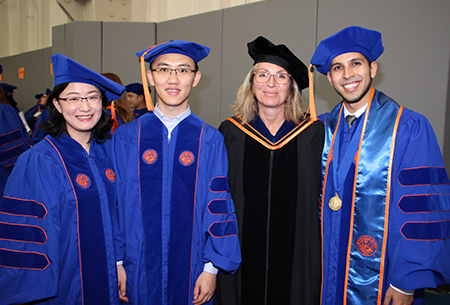I began advising PhD students soon after my appointment to the graduate faculty in 2001. My first PhD student graduated in 2005. I have since chaired a total of 19 PhD committees and served as member on 14 in my own department, Epidemiology, and Statistics. In 2009 I developed and directed a MS program funded by the Food and Drug Administration (FDA), which graduated 15 FDA employees. In 2011 I was appointed graduate program coordinator in our department. I volunteered for this position because it seemed to be a logical extension of my involvement in and passion for graduate education. While my responsibilities expanded to overseeing a program of more than 25 PhD students and 125 MS students, my mentoring approach has not changed. My mentoring philosophy is founded on three guiding principles.
Building Independence
Contemporary critics of the PhD degree have derided it as a “process of cloning that trains students to do what their mentors do.” I could not disagree more with this assessment. My goal as mentor is to graduate independent scientists who have the insight, maturity, and training to build an autonomous research program. I use several strategies to accomplish this. First, while I involve my students in my research early in their training, I never dictate the development of their thesis research questions. Some have generated their thesis as off-shoots of my ongoing research while others have explored entirely new areas. All my senior students have attested that, after a painful period of failing to find the faintest glimpse of a brilliant idea, she or he eventually assembled more questions than could be possibly answered. Second, while I provide close guidance during junior years, I take a different approach during the dissertation process. I do not provide solutions but rather highlight shortcomings and possible pitfalls until my students can fully support the chosen methodological approach. Refuting one’s own findings accomplishes a tremendous degree of confidence in understanding both their limitations and value. All my students have had different trajectories in their progression to independence, but most were characterized by a sudden, abrupt acceleration in growth. It is at this point that they will perform confidently in front of peers, embrace both the limitations and impact of their work, and clearly delineate their agenda for future research. One of the most rewarding experiences have been these moments when I realize that I can let my student fight his or her own battles.
Sharing one’s own passion and leading by example
Development of a successful research program requires a passion for science. To encourage “love of wisdom”, the meaning of a doctor of philosophy, I share my excitement and successes as well as my dissapointments. While I intend to build my students’ confidence in moving comfortably in the scientific community, I don’t hide related struggles. My students are involved in my grant applications and research projects as well as my work in scientific societies and for the FDA. I make it clear early on that my demands for them will be high, measured by my own engagement and accomplishments. One of the very first goals I communicate is to build their vita from the moment they enter our program by engaging in multiple research opportunities and making publishing a priority. My students have graduated with an average of 5 peer-reviewed publications and 8 peer-reviewed abstracts at national or international meetings. All have received intra- or extramural (e.g., NIH R36) awards and two have served as the student president of the International Society of Pharmacoepidemiology, the primary society in our field. All of my previous students work as scientists in the field of pharmacoepidemiology, including professorships and leadership roles at the FDA or pharmaceutical industry. The realization that they belong to a select group of experts, provides in my opinion the most powerful motivation in pursuing a scientific career.
 Nurture and Advocacy
Nurture and Advocacy
I have been fortunate to have a well-funded interdisciplinary research program that allows me to share many resources with my students. Beginning with my very first student, I supported all travel to present at national and international meetings. In addition to individual weekly meetings, I convene my students and research staff in a weekly research group meeting that is open to all students in our department. I believe I have established a philosophy of “giving back” among my students, where senior students mentor junior students and where knowledge and skills are shared to foster the success of our group. My goal is to immerse students in a vibrant research environment that nurtures their aspirations to become scientist and makes them feel both appreciated and challenged.
My work does not end with the thesis defense and is not measured by graduation. Except for one student who accepted a post-doctoral fellowship at Harvard, all of my students have directly assumed faculty positions or equivalent appointments in pharmaceutical industry or government. I support their career opportunities by introducing them to my network early on, by encouraging leadership roles that promote visibility, and by building a strong reputation of our graduate program nationally and internationally. Every year, I host a dinner for current students and alumni at our primary society’s annual meeting, and I have leveraged these relationships to build a host of internship opportunities that afford our students early work experiences. I believe that mentorship is not a temporary task but rather a personal, deeply-caring relationship, and I have stayed in close contact with all my students since their graduation. Watching my students’ careers evolve has been the greatest reward of my work.

